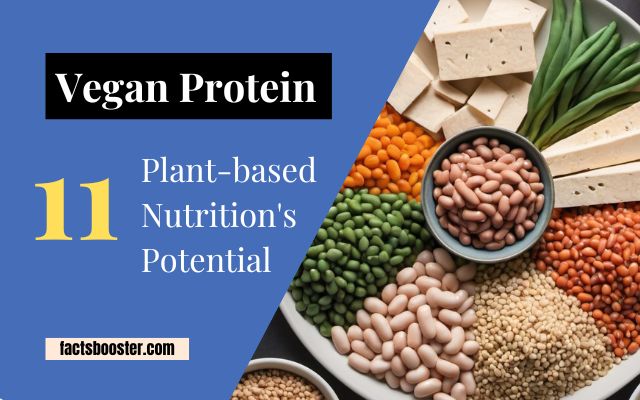In the realm of modern nutrition, vegan protein sources have surged to the forefront, capturing the attention of health enthusiasts worldwide. With an array of protein-rich vegan foods, from legumes to plant-powered protein powders, the quest for sustainable, wholesome nutrition has never been more vibrant.
This exploration delves into the vast potential of vegan protein, aiming to elucidate its health benefits, versatility, and environmental impact.
Key Takeaways:
- Discover the diverse array of vegan protein sources, from legumes and nuts to innovative plant-based meat alternatives.
- Understand the health and nutritional benefits offered by embracing a high-protein vegan diet.
- Consider the positive environmental impact of adopting plant-based nutrition practices.

About Plant-Based Nutrition
Plant-based nutrition signifies a diet primarily composed of foods derived from plants. This includes not only fruits and vegetables, but also nuts, seeds, oils, whole grains, legumes, and beans.
It doesn’t mean that you never eat meat or dairy, but rather that you are choosing more of your foods from plant sources. Different from many other diets, plant-based eating patterns focus on whole, unprocessed foods. These dietary choices exclude all animal products, emphasizing the health and environmental benefits of a diet rich in plant-powered protein.
By integrating a rich variety of vegan protein sources, such as legumes, soy products, and whole grains, this approach offers a comprehensive spectrum of nutrients essential for optimal health.
Health Benefits of Vegan Protein
Embracing vegan protein sources, such as legumes, soy products, and protein-rich vegan foods, offers significant health advantages. You will likely see a reduced risk of chronic diseases, a boon for those striving for longevity. Improved weight management becomes attainable, sidestepping the pitfalls of obesity.
Furthermore, expect enhanced biometric outcomes; blood pressure, cholesterol levels, and glucose control improve, thanks to plant-powered protein. These benefits underscore the vitality of incorporating plant-based protein into one’s diet.
Read more:
Vegan Protein Sources
Exploring the realm of vegan protein unveils a diverse array of sources, from legumes to plant-powered protein powders. These options offer not just vital nutrients but also versatility in dietary choices for those pursuing a vegan lifestyle.
High-protein vegan diets have evolved, incorporating protein-rich vegan foods that align with health goals and ethical considerations. Vegan protein supplements, complete vegan proteins, and vegan protein benefits mark the beginning of this exploration, setting the foundation for a deeper understanding of plant-based nutrition’s potential.
1. Legumes
Legumes stand as pillars in the vegan diet, celebrated for their plant-powered protein. These staples offer a spectrum of protein-rich vegan foods, serving as a cornerstone for anyone exploring the potential of plant-based nutrition.
Legumes, including beans, lentils, and peas, not only pack a powerful protein punch but also weave versatility into every meal. They emerge as complete vegan proteins when paired with grains, enriching a high-protein vegan diet. (1)
Furthermore, the inherent nutritional benefits of legumes, such as fiber and micronutrients, underscore their role in a holistic approach to health. For those integrating vegan protein sources into their diet, legumes represent a robust, nourishing choice that harmonizes with both the body and the environment.
2. Nuts and Seeds
Nuts and seeds stand as indispensable allies in a vegan diet, offering a potent mix of proteins, essential fats, and vital micronutrients. These nutritional powerhouses secure their place at the cornerstone of health-conscious meals.
They ensure a rich intake of protein for vegans, fulfilling dietary needs without compromise. For anyone committing to a plant-powered protein regimen, incorporating a variety of these can significantly enhance nutritional balance.
3. Soy Products
Soy products stand out as versatile and protein-rich vegan options. Yet, they present a case of balance. Benefits include high levels of plant-based protein and essential amino acids, critical for those avoiding animal products.
Concerns, however, orbit around soy’s phytoestrogen content, prompting discussion on its impact, especially among specific health groups. Informed choices can ensure these nutritional powerhouses bolster a vegan diet without undue worry. (2)
4. Vegetables
Vegetables have come to the forefront in the world of vegan protein. Beyond their rich nutrient profile, certain greens pack a surprising protein punch. With options like kale, spinach, and broccoli, you’re not just benefiting from fiber and vitamins but also fulfilling those essential protein needs. (3)
These plants offer a clean, green way to power up. Let them play a crucial role in your plant-powered protein journey, making every meal a step towards better health.
5. Spirulina and Chlorella
Spirulina and Chlorella have emerged as superfoods due to their exceptional protein content. These algae offer a powerhouse of nutrients, including essential amino acids vital for vegans.
Their health benefits are extensive, supporting everything from immune system function to energy levels. Not only are they protein-rich, but they also bring unique flavor profiles to a range of dishes, making them a favorite among those following a plant-powered protein diet.
6. Edamame
Edamame, a vibrant green soy product, brims with plant-powered protein, offering a superb choice for vegans seeking nutrient-rich foods. This youthful bean delivers not just protein but also fiber and essential vitamins. It makes for an excellent snack or addition, enhancing various meals with its healthful benefits.
7. Hemp Products
Hemp seeds, revered for their nutritional benefits, serve as powerhouse vegan protein supplements. Rich in omega fatty acids, these seeds offer a perfect blend for health enthusiasts. (4)
Users favor hemp protein powder not only for its protein content but also for the balance it provides. With each serving, you invite essential nutrients into your diet. Hemp oils, too, contribute to this nutrient-rich profile, making every meal a step towards better health.
8. Nutritional Yeast
Nutritional yeast emerges as a hero in the vegan culinary world, bringing with it a rich, cheesy flavor without any animal products. This powerhouse is not only a beloved vegan protein supplement but it also showers dishes with an abundance of B vitamins. (5)
Its versatility and nutritional profile make it a staple for those exploring protein-rich vegan foods, transitioning seamlessly from popcorn topping to a critical ingredient in creamy sauces.
9. Whole Grains
Whole grains stand out in a high-protein vegan diet. They provide not only protein for vegans but also essential amino acids, fiber, and other vital nutrients. These elements are foundational for maintaining overall health.
Including whole grains ensures individuals receive complete vegan proteins, supporting muscle and body function efficiently. They become crucial in a diet centered on plant-powered protein, demonstrating that a high-protein vegan diet is not only possible but also nutritionally rich.
10. Plant-Based Meat Alternatives
Plant-based meat alternatives have surged in popularity as sources of vegan protein. They offer a familiar taste and texture for those transitioning to a vegan diet. Protein-rich vegan foods like these can be invaluable.
Yet, they sometimes harbor additives and undergo extensive processing. This reality poses a dilemma. High-protein vegan diets benefit from such innovations, but mindfulness around consumption is essential.
Balancing these considerations has become key for vegans seeking complete protein sources without compromising health.
11. Plant-Based Dairy Alternatives
The market has witnessed an impressive surge in plant-based dairy alternatives, including almond milk, soy yogurt, and coconut cheese. These substitutes cater not just to those following a high-protein vegan diet but also to anyone looking to diversify their protein sources.
Unlike their animal-based counterparts, vegan protein sources like these often come with lower levels of saturated fats and no cholesterol. They provide essential nutrients, making them a heart-healthy choice.
Moreover, vegan protein powder derived from these alternatives can seamlessly augment one’s protein intake without sacrificing taste or texture.
Environmental Impact
The environmental benefits of embracing a vegan diet are profound. You will see a notable decrease in your carbon footprint. This diet demands minimal resource usage compared to diets heavy in animal products. Indeed, the sustainable nature of plant-based protein sources, such as legumes, nuts, and seeds, offers an eco-friendly alternative.
By choosing vegan protein sources, you actively contribute to lessening the strain on our planet’s resources. It prompts us to consider not just our nutritional well-being but also the health of our environment. Such actions pave the way for a sustainable future for all.
Conclusion
Throughout this exploration, we’ve uncovered the vast health and environmental advantages of embracing vegan protein sources, including legumes, nuts, seeds, and soy products, among others. These plant-powered proteins offer a sustainable path to managing weight, preventing chronic diseases, and fostering a healthier planet. We invite you to delve deeper into plant-based nutrition and discover its potential to transform your health and the environment.


